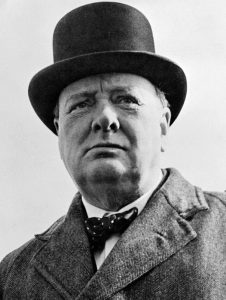
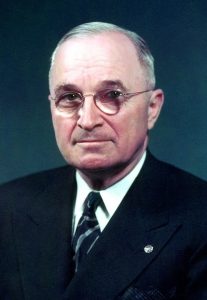 “Who was Winston Churchill?” It’s not a question you often hear, because Winston Churchill had a presence. His features were distinct, but he was not a big man. Churchill stood 5’6½” tall and weighed 187 pounds. He was maybe 35 pounds overweight, but not in bad health, especially considering he smoked as many as ten cigars a day, and when you consider that he lived to be 90 years old, it would seem that none of the normal “risk factors” applied to Winston Churchill. He dealt with daily stress, poor eating habits, excess weight, and smoking, but outlived many people in this era or that. How people felt about Winston Churchill, depended on which side of the subject in question they were on. When he made up his mind on a matter, he rarely changed his mind, and he didn’t back down.
“Who was Winston Churchill?” It’s not a question you often hear, because Winston Churchill had a presence. His features were distinct, but he was not a big man. Churchill stood 5’6½” tall and weighed 187 pounds. He was maybe 35 pounds overweight, but not in bad health, especially considering he smoked as many as ten cigars a day, and when you consider that he lived to be 90 years old, it would seem that none of the normal “risk factors” applied to Winston Churchill. He dealt with daily stress, poor eating habits, excess weight, and smoking, but outlived many people in this era or that. How people felt about Winston Churchill, depended on which side of the subject in question they were on. When he made up his mind on a matter, he rarely changed his mind, and he didn’t back down.
He was responsible for one of the most famous speeches of the Cold War period. It was a speech in which former British Prime Minister Winston Churchill condemned the Soviet Union’s policies in Europe and declared, “From Stettin in the Baltic to Trieste in the Adriatic, an iron curtain has descended across the continent.” Churchill’s Cold War speech is one of the “opening volleys” announcing the beginning of the Cold War. When he was defeated for re-election as prime minister in 1945, he was invited to Westminster College in Fulton, Missouri, which is where he gave this speech. President Harry S Truman joined Churchill on the platform and listened intently to his speech. Expressing praise for the United States, Churchill declared that the United States stood “at the pinnacle of world power.” England and the United States have long had a “friendly, but competitive relationship,” and it would soon become quite clear that a primary purpose of his talk was to argue for an even closer “special relationship” between the United States and Great Britain…the two great powers of the “English-speaking world.” But, would it be in the best interest of the United States to agree?
World War II had ended, and as in any post war situation, things were still pretty chaotic. Nevertheless, it was necessary to set policies, and to organize the losing countries so that things didn’t escalate out of control 
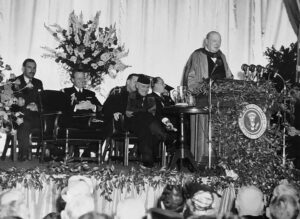 again…not an easy task. The Soviet Union was well known for its expansionistic policies and was unlikely to stop trying to take over its neighbors without some kind of intervention. In addition to the “iron curtain” that had descended across Eastern Europe, Churchill spoke of “communist fifth columns” that were operating throughout western and southern Europe. Churchill compared the Soviet Union to disastrous consequences of the appeasement of Hitler prior to World War II, saying that in dealing with the Soviets there was “nothing which they admire so much as strength, and there is nothing for which they have less respect than for military weakness.” Therefore, without intervention, they would quickly get back to the same disastrous practices they used before, and the war would have to fought all over again.
again…not an easy task. The Soviet Union was well known for its expansionistic policies and was unlikely to stop trying to take over its neighbors without some kind of intervention. In addition to the “iron curtain” that had descended across Eastern Europe, Churchill spoke of “communist fifth columns” that were operating throughout western and southern Europe. Churchill compared the Soviet Union to disastrous consequences of the appeasement of Hitler prior to World War II, saying that in dealing with the Soviets there was “nothing which they admire so much as strength, and there is nothing for which they have less respect than for military weakness.” Therefore, without intervention, they would quickly get back to the same disastrous practices they used before, and the war would have to fought all over again.
The speech was well received by Truman and many other US officials. Everyone knew the truth, and somebody simply had to come right out and say it. They had decided that because the Soviet Union was determined to expand, only a tough stance on a united front would deter the Russians. Churchill’s “iron curtain” phrase immediately entered the official vocabulary of the Cold War. It was a term everyone knew, and it perfectly described the problem. Of course, agreeing with Churchill, didn’t necessarily mean that the US officials enthusiastic about Churchill’s call for a “special relationship” between the United States and Great Britain. They weren’t concerned that Great Britain would again try to have some influence over the United States, but rather they were well aware that Britain’s power was weakening, and the US had no intention of being used as pawns to help support the crumbling British empire.
Of course, the Russian leader Joseph Stalin had a very different view of the speech, saying that it was “war 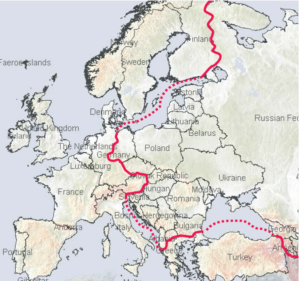
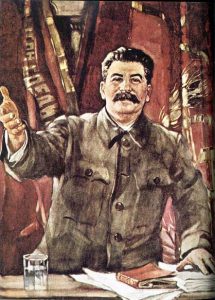 mongering” and referred to Churchill’s comments about the “English-speaking world” as imperialist “racism.” The British, Americans, and Russians, all of whom were allies against Hitler less than a year before the speech, were now drawing the battle lines of the Cold War. It didn’t take long for the similarities between Hitler and the Soviet Union to become glaringly clear, and they had to be stopped. I don’t know why dictators feel the need to enslave other people. The “Iron Curtain” would “come down” like all other forms of tyranny must eventually do, but unfortunately, a lot of lives are lost before victory is achieved.
mongering” and referred to Churchill’s comments about the “English-speaking world” as imperialist “racism.” The British, Americans, and Russians, all of whom were allies against Hitler less than a year before the speech, were now drawing the battle lines of the Cold War. It didn’t take long for the similarities between Hitler and the Soviet Union to become glaringly clear, and they had to be stopped. I don’t know why dictators feel the need to enslave other people. The “Iron Curtain” would “come down” like all other forms of tyranny must eventually do, but unfortunately, a lot of lives are lost before victory is achieved.


Leave a Reply